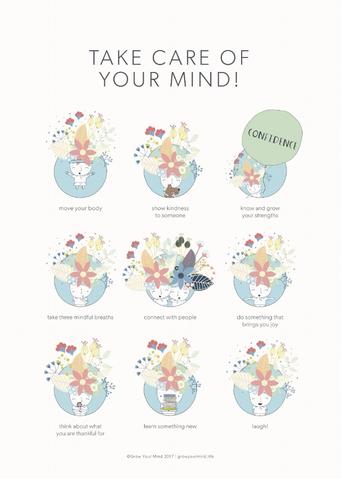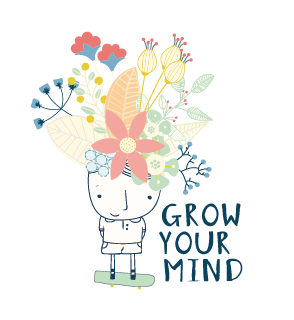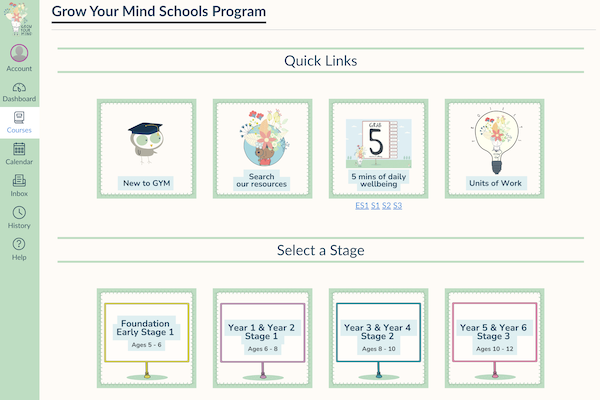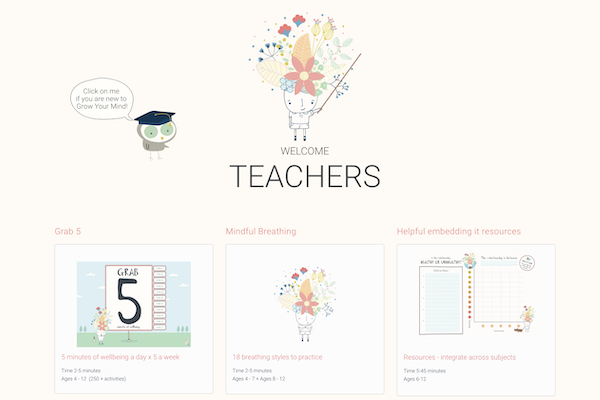by Alice Peel September 3, 2018
Mental health awareness month is fast approaching. At Grow Your Mind we have created a checklist poster with different visual invitations to do something for your mental health. There are 9 items on our list which we will explore in the lead up to October and throughout mental health month. We thought we would start with a not so obvious one: Show kindness to someone.

So clearly being kind is quite a popular goal, generally speaking we like to think of ourselves as kind, we want to raise kind kids and we like it when people are kind to us. But there are other benefits to being kind: it’s good for our mental health. When Grow Your Mind visits schools or schools invest in our resources, they quickly become familiar with one of our favourite quotes:
“Be kinder than necessary because everyone you meet is fighting some kind of battle.”

We love this quote because you are essentially setting the bar high when it comes to showing kindness to others. We also love it because there is a strong message of compassion in it – and don’t even get us started on the mental health benefits of this! You will have to wait, as compassion deserves its own dedicated article.
Note, the quote does NOT say “Be kinder than necessary to the people you like that don’t bug you”. We tend to have this down pat. It is after all fairly easy to be super kind to people we like and admire. But at school, in our home life or on the sporting field we will continually meet people who get under our skin. How do we be kinder than necessary to them?! And maybe we should extend this question to: why be kinder than necessary to them?
Let’s start with how.
Keep your Guard Dog small. An enlarged amygdala is not going to bring forth the kinder than necessary part of yourself. Practice mindfulness to do this. We are not calling on you and your 3 year old to meditate for an hour a day. Just take a mindful moment. Three deep breaths, a round of finger breathing, a moment to pause and notice how you are feeling or a quick reminder of three good things in your day.
Model being kind: Let’s say, you are with your children and have a tonne of items in your trolley at the supermarket. The person behind you only has a few. You offer for them to go first. Kinder than necessary. Or, another first world problem scenario: What do you do when a car cuts you off and your children are in the car? Give them the bird? Shout out a few expletives? Quick disclaimer – we are as guilty of this as anyone. How about next time, try naming your emotion but offering a bit of compassion up too. “Gosh that is frustrating when a car cuts you off, they must be having a hard day to be in such a rush”. Right here and now you are modelling for your child the next time someone bugs them – they name their emotion but they still act with kindness.
Set a kindness intention: Ask your child as they set off for school, how are you going to be kinder than necessary today? In particular put the emphasis on, how could you do something nice for someone who bothers you? Or at the end of the day see if you can elicit some information about acts of kindness they carried out. You are showing your child that your family values kindness. This is not to be confused with rewarding kindness, see next point:
Take rewards out of the kindness expectation: Dr Helen Street from the University of Western Australia argues strongly against extrinsic rewards for kindness. So if you want your children and students to be kind then pop away your certificates and gold stars. Tell them to be kind for kindness sake. No one is watching you, still be kind. There is more research out there on the implications of rewarding kindness and the fact that it tends to dull motivation.
Finally, why be kinder than necessary?
From a survival point of view: Everyone is facing a battle! The very nature of being human means that we will inevitably experience sadness, setbacks and failures. Yet despite this we are also capable of being a resilient species. We are familiar with Charles Darwin’s phrase “survival of the fittest” from his evolutionary theory. Interestingly, Darwin wrote a 828 page sequel to On the Origin of Species in which he mentioned ‘survival of the fittest’ only twice, while LOVE is spoken about 95 times. Our tendency to care for one another is perhaps our strongest and most adaptive instinct in keeping us alive.
From a selfish point of view: Kindness is good for the heart, the body releases a hormone called oxytocin when you are kind, which helps to protect and strengthen your heart. Even the neuroscience and social science research is clear. Kindness changes the brain, it makes us more resilient and allows us to feel more connected.
From a changing the world point of view: Where to start? Imagine if our political leaders still spoke with respect despite having vastly different views. In fact, we will leave you with this food for thought from a Year 4 student at St Brendan’s who sums up beautifully our reason for being and the power of being kinder than necessary. Some background information: students were asked to make a wish for the planet. His response:
“My wish is that Donald Trump could do the Grow Your Mind lessons. And if we was too busy for the lessons, that he could at least have a Home kit. Imagine how much more peaceful the world would be then?:”


